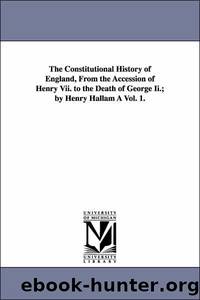The Constitutional History of England, From the Accession of Henry Vii. To the Death of George Ii.; By Henry Hallam a Vol. 1. by Henry Hallam

Author:Henry Hallam [Hallam, Henry]
Language: eng
Format: epub
ISBN: 9781425544188
Amazon: B01C7A3LMY
Barnesnoble: B01C7A3LMY
Goodreads: 29552496
Publisher: Scholarly Publishing Office, U of MI
Published: 2006-09-13T00:00:00+00:00
CHAPTER VII
ON THE ENGLISH CONSTITUTION FROM THE ACCESSION OF CHARLES I. TO THE DISSOLUTION OF HIS THIRD PARLIAMENT
1625-1629
Charles the First had much in his character very suitable to the times in which he lived, and to the spirit of the people he was to rule; a stern and serious deportment, a disinclination to all licentiousness, and a sense of religion that seemed more real than in his father.[629] These qualities we might suppose to have raised some expectation of him, and to have procured at his accession some of that popularity, which is rarely withheld from untried princes. Yet it does not appear that he enjoyed even this first transient sunshine of his subjects' affection. Solely intent on retrenching the excesses of prerogative, and well aware that no sovereign would voluntarily recede from the possession of power, they seem to have dreaded to admit into their bosoms any sentiments of personal loyalty, which might enervate their resolution. And Charles took speedy means to convince them that they had not erred in withholding their confidence.
Elizabeth in her systematic parsimony, James in his averseness to war, had been alike influenced by a consciousness that want of money alone could render a parliament formidable to their power. None of the irregular modes of supply were ever productive enough to compensate for the clamour they occasioned; after impositions and benevolences were exhausted, it had always been found necessary, in the most arbitrary times of the Tudors, to fall back on the representatives of the people. But Charles succeeded to a war, at least to the preparation of a war, rashly undertaken through his own weak compliance, the arrogance of his favourite, and the generous or fanatical zeal of the last parliament. He would have perceived it to be manifestly impossible, if he had been capable of understanding his own position, to continue this war without the constant assistance of the House of Commons, or to obtain that assistance without very costly sacrifices of his royal power. It was not the least of this monarch's imprudences, or rather of his blind compliances with Buckingham, to have not only commenced hostilities against Spain which he might easily have avoided,[630] and persisted in them for four years, but entered on a fresh war with France, though he had abundant experience to demonstrate the impossibility of defraying its charges.
Parliament of 1625.âThe first parliament of this reign has been severely censured on account of the penurious supply it doled out for the exigencies of a war, in which its predecessors had involved the king. I will not say that this reproach is wholly unfounded. A more liberal proceeding, if it did not obtain a reciprocal concession from the king, would have put him more in the wrong. But, according to the common practice and character of all such assemblies, it was preposterous to expect subsidies equal to the occasion, until a foundation of confidence should be laid between the Crown and parliament. The Commons had begun probably to repent
Download
This site does not store any files on its server. We only index and link to content provided by other sites. Please contact the content providers to delete copyright contents if any and email us, we'll remove relevant links or contents immediately.
| Africa | Americas |
| Arctic & Antarctica | Asia |
| Australia & Oceania | Europe |
| Middle East | Russia |
| United States | World |
| Ancient Civilizations | Military |
| Historical Study & Educational Resources |
Room 212 by Kate Stewart(4816)
The Crown by Robert Lacey(4617)
Endurance: Shackleton's Incredible Voyage by Alfred Lansing(4549)
The Iron Duke by The Iron Duke(4159)
The Rape of Nanking by Iris Chang(4051)
Killing England by Bill O'Reilly(3908)
Joan of Arc by Mary Gordon(3855)
Say Nothing by Patrick Radden Keefe(3763)
I'll Give You the Sun by Jandy Nelson(3296)
Shadow of Night by Deborah Harkness(3202)
Hitler's Monsters by Eric Kurlander(3192)
Mary, Queen of Scots, and the Murder of Lord Darnley by Alison Weir(3101)
Blood and Sand by Alex Von Tunzelmann(3079)
Darkest Hour by Anthony McCarten(3027)
Margaret Thatcher: The Autobiography by Thatcher Margaret(2982)
Eleanor & Park by Rainbow Rowell(2962)
Red Famine: Stalin's War on Ukraine by Anne Applebaum(2825)
Book of Life by Deborah Harkness(2762)
The One Memory of Flora Banks by Emily Barr(2704)
